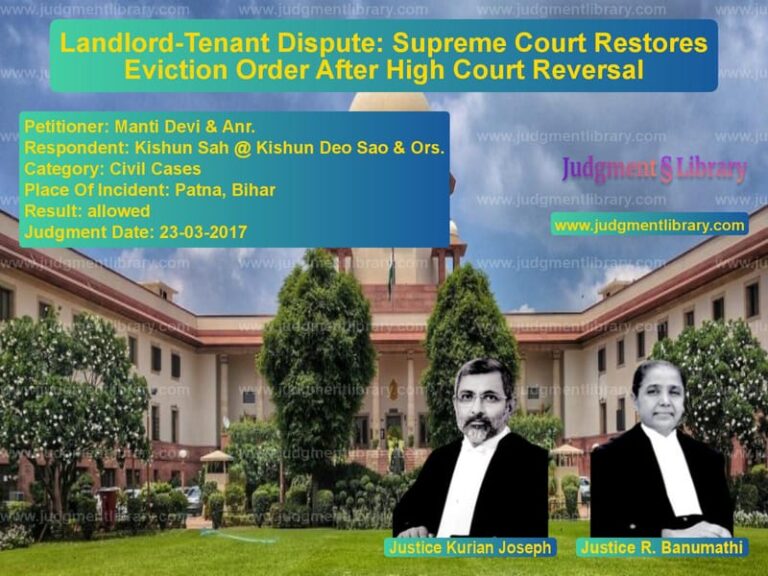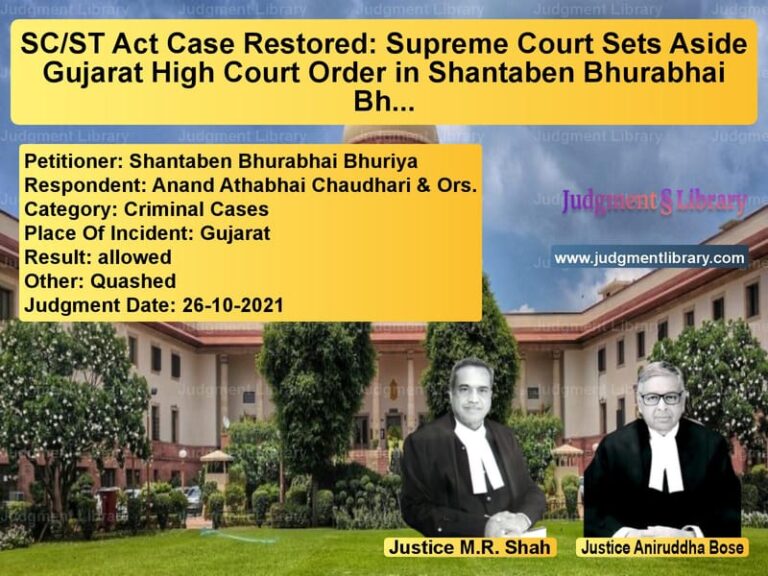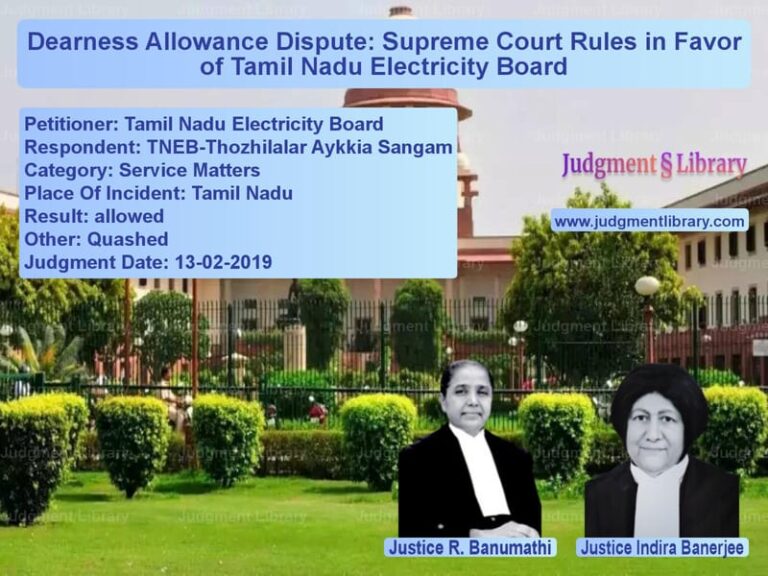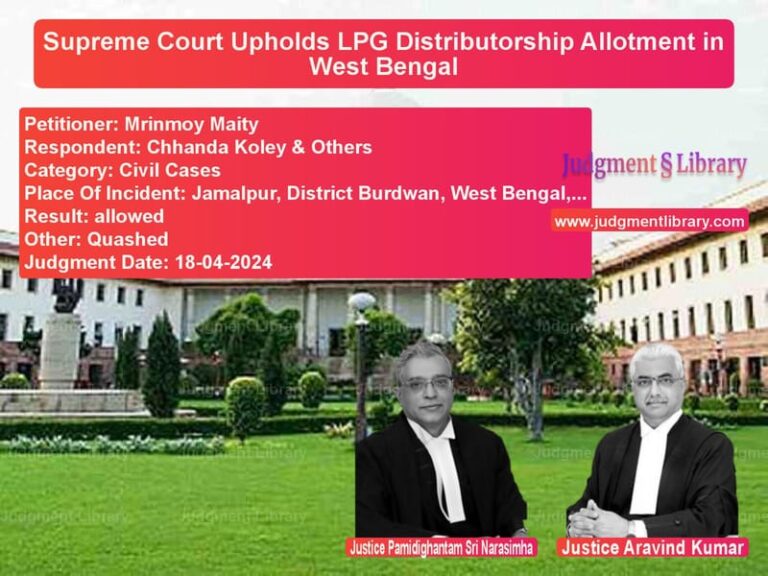POCSO Act Interpretation: Supreme Court Overturns Bombay High Court’s ‘Skin to Skin’ Ruling
The Supreme Court of India recently ruled on an important case involving the Protection of Children from Sexual Offences Act (POCSO Act), 2012. The case, Attorney General for India vs. Satish & Others, addressed the issue of whether physical contact through clothing could constitute ‘sexual assault’ under Section 7 of the POCSO Act. The judgment overturned the controversial ruling by the Bombay High Court, which had acquitted the accused by interpreting that ‘skin-to-skin’ contact was necessary to prove sexual assault.
Background of the Case
The case arose from an incident in which the accused, Satish, was convicted by a Special Court under Sections 342, 354, and 363 of the Indian Penal Code (IPC) and Section 8 of the POCSO Act. The conviction was based on the testimony of the victim, a 12-year-old girl, who stated that the accused took her to his house, attempted to remove her salwar, pressed her breast, and covered her mouth to prevent her from shouting.
The Bombay High Court, however, acquitted Satish of charges under the POCSO Act while upholding his conviction under IPC Section 354. The court reasoned that since the accused had not engaged in ‘skin-to-skin’ contact with the victim, the act did not fall under ‘sexual assault’ as defined by the POCSO Act.
Petitioner’s (Attorney General for India) Arguments
The Attorney General for India and the National Commission for Women challenged the High Court’s ruling, arguing:
- The interpretation of ‘sexual assault’ should not be limited to ‘skin-to-skin’ contact.
- The POCSO Act was enacted to provide stringent protection to children, and a narrow interpretation would defeat its purpose.
- The act of pressing the child’s breast with sexual intent constituted sexual assault, regardless of whether it was through clothing.
- Such a ruling could set a dangerous precedent and allow perpetrators to escape punishment by ensuring there was a layer of clothing during the act.
Respondent’s (Accused’s) Arguments
The defense argued that:
- The High Court had correctly interpreted the law and applied the principle of strict construction in criminal jurisprudence.
- The POCSO Act does not define ‘physical contact,’ and the absence of direct ‘skin-to-skin’ contact should be a factor in determining the severity of the offense.
- The accused should not be subjected to a harsher punishment under the POCSO Act when the offense could be covered under IPC provisions.
Supreme Court’s Judgment
The Supreme Court overruled the Bombay High Court’s decision and reinstated the conviction under the POCSO Act. The key observations made by the Supreme Court included:
“The act of touching any sexual part of the body with sexual intent or any other act involving physical contact with sexual intent, could not be trivialized or held insignificant or peripheral so as to exclude such act from the purview of ‘sexual assault’ under Section 7 of the POCSO Act.”
The Court further stated:
“Restricting the interpretation of the words ‘touch’ or ‘physical contact’ to ‘skin to skin contact’ would not only be a narrow and pedantic interpretation of the provision contained in Section 7 of the POCSO Act, but it would lead to an absurd interpretation of the said provision.”
Final Decision
The Supreme Court held that the High Court had committed a gross error in applying the ‘skin-to-skin’ interpretation and restored the accused’s conviction under Section 8 of the POCSO Act. The Court ruled that the accused would serve a sentence of three years of rigorous imprisonment and pay a fine. Additionally, the Court ruled that the interpretation of ‘physical contact’ must be broad to prevent any loopholes that could be exploited by offenders.
Conclusion
The judgment reinforces the principle that child protection laws should be interpreted in a manner that upholds their intended objective. By clarifying that ‘sexual assault’ under the POCSO Act does not require direct skin-to-skin contact, the Supreme Court has ensured that offenders cannot exploit technicalities to evade punishment. This ruling sets a strong precedent in cases of child sexual abuse and ensures that the law remains an effective tool for protecting children.
Petitioner Name: Attorney General for India.Respondent Name: Satish and Another.Judgment By: Justice Uday Umesh Lalit, Justice Bela M. Trivedi, Justice S. Ravindra Bhat.Place Of Incident: Maharashtra.Judgment Date: 18-11-2021.
Don’t miss out on the full details! Download the complete judgment in PDF format below and gain valuable insights instantly!
Download Judgment: attorney-general-for-vs-satish-and-another-supreme-court-of-india-judgment-dated-18-11-2021.pdf
Directly Download Judgment: Directly download this Judgment
See all petitions in SC/ST Act Case
See all petitions in Juvenile Justice
See all petitions in Judgment by Uday Umesh Lalit
See all petitions in Judgment by Bela M. Trivedi
See all petitions in Judgment by S Ravindra Bhat
See all petitions in allowed
See all petitions in Quashed
See all petitions in supreme court of India judgments November 2021
See all petitions in 2021 judgments
See all posts in Criminal Cases Category
See all allowed petitions in Criminal Cases Category
See all Dismissed petitions in Criminal Cases Category
See all partially allowed petitions in Criminal Cases Category







